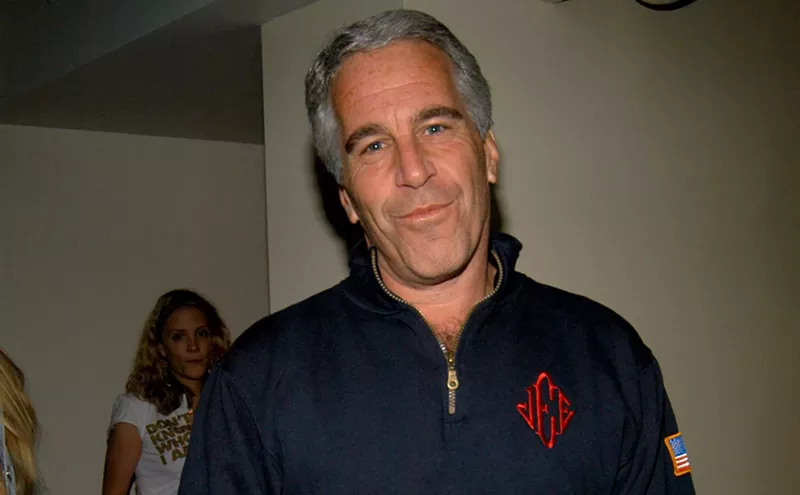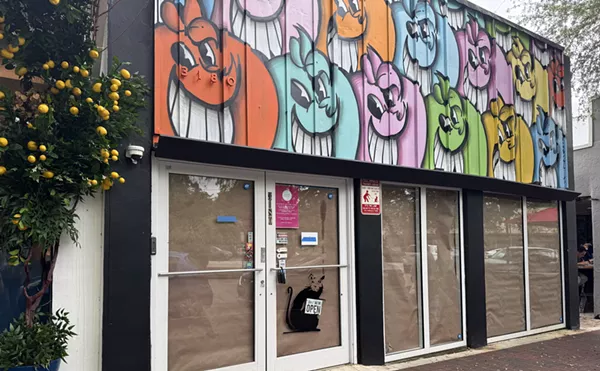After turning up its nose at Wim Wenders's cinematic portrait of the band because of the film's “whiff of neocolonialism,” Granma went on to refer to Buena Vista executive producer Nick Gold as a “wily fox,” and its orchestrator Ry Cooder as someone “expert in finding in the Third World what the First World needs.”
Over in Bristol, England, Up, Bustle and Out's Rupert Mould is bit less catty than Granma, but his attitude toward Buena Vista mania is no less critical. Although his own group's new album, Master Sessions 1, also is an onsite collaboration with an assemblage of Havana salseros, Mould insists his project couldn't be further removed from Ry Cooder's -- neocolonialist aroma and all.
“I didn't like the way [Buena Vista Social Club] avoided anything that was slightly controversial,” Mould says by phone from his Bristol apartment. After turning down a frantic drum and bass tune and shushing several voices in the background, he continues, “When you spend that much time working with musicians in Cuba, you're going to come across the daily struggles in their lives. And we did -- every day!” Of the twelve days in April 1998 that Up, Bustle and Out spent recording in Havana's Sonocaribe Studios, he says, “Among the twenty musicians it would be quite a debate: economic issues, the government, the blockade, the Cuban equation of their situation.” Referring to Wenders's Buena Vista Social Club, he adds with obvious disdain: “To record a whole project on film, present it to the world on that scale, and never to have covered any of that is a bit superficial.”
That's an accusation no one's going to level at Up, Bustle and Out. The group first appeared as part of Bristol's trip-hop milieu in the early Nineties, releasing several albums on England's influential Ninjatune label alongside that city's Portishead, Smith and Mighty, Massive Attack, and Tricky. But while all those artists shared a common love for hip-hop, Seventies funk, and dub reggae's cut-and-paste aesthetics, Up, Bustle and Out also drew upon a wide range of world-music sources: Indian ragas, Andean flute riffs, and salsa. (A current work in progress focuses on the Balkans, utilizing the Serbian No Smoking Orchestra heard in several of Emir Kusturica's films.)
Suffused through all this is Mould's unabashed embrace of revolutionary politics, a driving force that led him in 1994 to backpack through the jungles of southern Bolivia, retracing the steps of Che Guevara's doomed 1967 guerrilla struggle there. With obvious relish he notes that the spot where Guevara was felled is not far from where famed bank robber Butch Cassidy (another man of action dear to Mould's heart) was killed.
Accordingly Master Sessions is both a tribute to and a sonic reworking of Cuba's Radio Rebelde, the clandestine station established by Fidel Castro's July 26th Movement in 1958 -- and now the primary internal mouthpiece of the Cuban state. Impressed by Mould's stance (and no doubt his donation of several thousand dollars' worth of computers, CD players, CDs, and DAT recorders to the Radio Rebelde studio), the Cuban government opened its audio archives to him. Snatches of Guevara broadcasting from the Sierra Maestra waft eerily between the album's mix of classic descargas and shuffling, of-the-moment breakbeat constructions.
“Radio Rebelde was a pirate station when it started,” Mould explains, “and pirate radio in Bristol is what started me in my career. Massive Attack, Neneh Cherry, and all of us did shows together on a pirate station here. It's a medium where you can still reach out to popular culture and go against the grain.”
Although the Cuban musicians with whom Mould worked at Sonocaribe were corralled by flautist Richard Egües, long renowned for his pioneering work as a key member of Orquesta Aragón in the Fifties (as well as his recent appearances on the Cooder/Gold-conceived albums from Buena Vista pianist Rubén González and the Afro-Cuban All Stars debut), he insists Master Sessions is no nostalgic retread.
“The Buena Vista thing was a bunch of old-timers resurrected for some burst of jaded glory. The only reason I wanted to have a maestro involved in the project is because people look up to them. They provide a certain level of discipline in the studio. But a lot of the musicians we used were my age: late twenties, early thirties. A couple of the lads on percussion were as young as eighteen; they were telling me about their hip-hop demos. It was a broad spectrum of generations and musical backgrounds.”
The end result of this fusion isn't quite the sound clash one would have expected based on Up, Bustle and Out's previous work. Instead Egües's group is allowed to jam largely unmolested, swinging into loose-limbed, jazz-inflected pieces that revolve around graceful piano comps. Then radio static will filter in, giving way to a sampled Radio Rebelde transmission. The voice of Che will heartily declaim on the “compañeros de Fidel,” flowing into a double-time drum loop (complete with the crackle of its original vinyl source), an overmodulated Hammond organ, some frenetic cowbell whacking, and a slinky, funkified bass line.
It's only toward the very end of Master Sessions that Mould employs a Cuba-in-a-blender approach: “Carbine 744, 520” places an insistently strummed flamenco guitar front and center against a fiery James Brown-style get-on-the-good-foot groove; “Made in Cuba, Part 1” uses live DAT recordings, dropping street-corner conga players into its harsh wash of Havana police radio communications and Santiago street ambiance.
“I wanted to reflect the two worlds, the two histories,” Mould notes. “Here's the Bristol sound: hip-hop barrio tracks, upbeat rhythms, studio production. But echo that with their style, the descarga. I wanted to show that Fifties son and a 2000 studio record could be played back to back in a club, and youths today would love it.”
In a passage from The Rebel Radio Diary, Mould's just-published book-length account of recording the Master Sessions and his subsequent travels across Cuba, he relates some of his ambivalence at these two worlds -- DJ culture and son -- colliding.
Gazing out from behind the Sonocaribe mixing board as the sessions began, he writes, “[It] reminded me of why I once chose to be a performing musician, on the road, lugging equipment, long journeys and long nights. It would sound crazy to these maestros to know that I can now earn more money and put in less time by DJing. The live scene is simply where I would prefer to be, but high costs prevent it. The feeling of performing together, reading and inspiring each other, and causing the dance floor to erupt is a stimulant that makes it all worthwhile.”
On this side of the Florida Straits, however, it's not Mould's guilt over the ascension of DJs on the nightclub scene that's bound to raise eyebrows; it's his impassioned defense of the Cuban revolution. Which is exactly what he's hoping for.
“It's important to me that people in Miami hear this record,” Mould says earnestly. “I feel certain that if a lot of second-generation Cubans in Miami went over to Havana, they wouldn't find it as bad as they've been told. There's a certain amount of amazing grace and enchantment there -- you can't help but see it and feel it. It's not that bad!”
Perhaps sensing the implications of his words, Mould continues cautiously: “Don't get me wrong. There's no getting away from Cuba being a totalitarian state, and at times for a local, I should imagine it feels like one big prison. But they've achieved so many outstanding things. I've traveled extensively around Latin America, and the basic poverty in Cuba is nothing compared to what it is in Peru, Brazil, Bolivia. It all depends on the ground you're starting from. In Lima or Rio you'll see thousands of children sleeping on the streets. I didn't see any of that in Cuba.”
Informed by Kulchur that he just blew any chance of ever spinning on the turntables in a Miami club, Mould turns annoyed. “People in Miami should realize that Elian Gonzalez thing has been broadcast all over the world,” he says sharply. “And none of the Miami [Cuban-exile community's] campaign won any sympathizers in this part of the world. We looked on it with horror!”
Recalling the televised demonstrations around the Gonzalez relative's Little Havana home, he says, “I saw them holding up posters with pictures of Mrs. Thatcher and Ronald Reagan and the word ¡Si! And next to them was a picture of Castro with ¡No! Well, to many of us in this part of the world, Reagan and Thatcher were the worst dictators the world's ever known in this part of the century! They were warlords; they steamed into countries out for complete domination. For many of us, Thatcher is someone who really ruined the philosophy of this country. She broke down the family, broke down the general community feel of this country, made everyone an individual living on their own.”
Hold on there, comrade. Is Mould suggesting that Thatcher was a worse dictator than Fidel Castro? “Far worse, far worse,” he answers emphatically. Mould then downshifts into a gentler tone. “I hate to say this -- and I don't mean to offend you -- but America is not a loved country,” he murmurs. “There's so many people from all walks of life who will tell you about how the United States is trying to police the world, telling everybody how to live. For many people Cuba holds a certain respect for its resistance to that.”
Mould begins growing agitated again, launching into an array of the ways American culture is sprawling, creating one bland, sterile planet: “All anybody wants to talk about is the Internet, and the whole thing's bloody American!” He recalls his recent return from one foreign tour of DJing, whereupon he bumped into Cuba's Afro-Cuban All Stars inside London's Heathrow Airport.
“They looked like they just stepped out of New York,” he notes with a chuckle. “The younger ones had gold chains, baseball caps, shorts down to their knees. It was so funny to see.”
Wouldn't that image imply that not all Cuba's younger generation shares its government's avowed resistance to the trappings of American pop culture? Mould turns quiet. The only noise is the crackling of the transatlantic phone line. Then in the downcast voice of a man who's just been told his dog has died, he recapitulates: “There's a certain uniformity sweeping across the world.”












